Bridgeway Academy and Local Matters
December 15, 2015
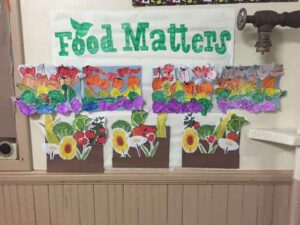
This school year Helping Hands Center / Bridgeway Academy has partnered with Local Matters to incorporate the Food Matters curriculum into our weekly health and science lessons. Food Matters is a 24-week food and ecology curriculum that provides children with an understanding of what healthful food is, where it comes from, how it grows, and how it’s prepared. “Food Matters’ holistic, multicultural and multi-sensory approach is unique among children’s nutrition education. The lessons give kids a language to talk about food, and help them understand the relationship between food and strong bodies. Kids emerge from the course with an appreciation for fresh, healthy foods, which serves as a foundation for lifelong healthy eating habits.” www.localmatters.org
Classroom teachers and members of the Food Acceptance Team are leading lessons one time a week for 30-60 minutes. Classroom teachers are also carrying over the vocabulary and content from these lessons into other lessons throughout the week. Check out what we’ve been eating and learning about!
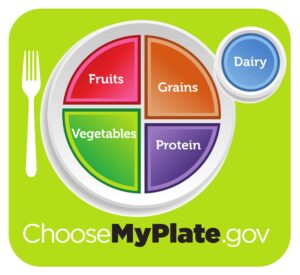
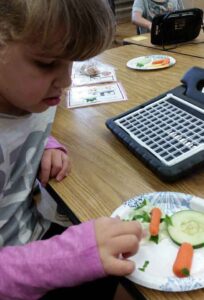
Week 1: Food Matters.
We learned about the USDA MyPlate food guide for making healthful food choices. With the MyPlate we can categorize foods as fruits, vegetables, proteins, whole grains or dairy. We also learned the importance of hand washing before food prep and eating with a catchy song. The whole food we tasted this week was pears.
The Hand Washing Song
By Monique McCoy
First we squirt the soap. Then we rub, rub, rub.
We lock our fingers tight and we scrub, scrub, scrub.
We rinse them on the front and we rinse them on the back;
We say bye-bye to germs because they’re gone like that!
Week 2: What do Plants Need to Live?
Plants are living things, an important source of food for humans and need food, soil, sunlight and water to live. Many classrooms planted seeds in cups of soil, watered them and put them by a window to get sunlight. We discussed plants that are also foods such as fruits and vegetables. We also started taking leftover food out to a compost bin to create food for the plants in our on-site garden. Key vocabulary related to week 2 includes: plants, food, air, water, shelter, sunlight and compost. Week 2 we started food prep by making a fresh herb tofu dip to eat with carrots and cucumbers.
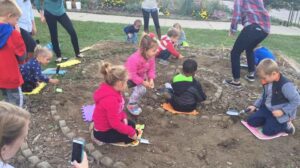
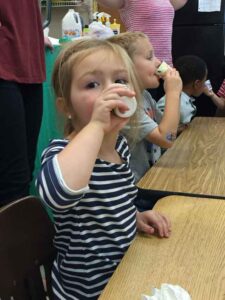
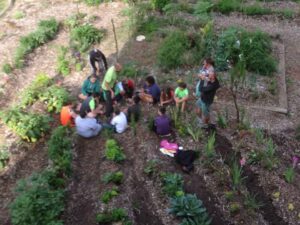
Week 3: Farms and Farmers.
During week 3 lessons we identified farms as important sources of food and learned about the great variety of foods produced in Ohio. Ohio farmers grow and produce more than 200 crops and products! We discussed the difference in appearance between vegetables from grocery stores and vegetables from local farmers markets. Classrooms got hands on experience “harvesting” carrots from soil and cleaning them to prepare for eating. Key vocabulary this week included healthful foods, harvest and local. The whole food we tasted was roasted carrot. Carrots were sliced and roasted with olive oil and salt.
Week 4: Gardens.
Students learned that food is grown in gardens. We took trips out to our on-site garden and used garden tools to dig in the dirt and harvest a few vegetables. Students also learned that gardens are not just for food but also for beautifying outdoor spaces. Vocabulary related to week 4: gardens, community gardens, gardening gloves, spade, and watering can.
Students tasted a garden salad consisting of lettuce, shredded carrots, sliced cucumbers, sliced tomatoes and shredded cabbage. Preparation included tearing the lettuce, cutting the tomatoes and making a vinaigrette salad dressing.
Food prep: Vinaigrette
Week 5: Food Medicine.
Students learned that foods we eat affect our health. Raw and lightly cooked fruits and vegetables have high amounts of Vitamins A, B, C, D, E and K. Students know that different brightly colored fruits and vegetables contain vitamins that are beneficial to our bodies. Vocabulary related to week 5: vitamin, medicine, smoothie, and healthful. We all tasted a green smoothie made from spinach, peaches, bananas, cucumbers and apple juice.
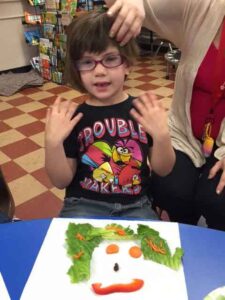
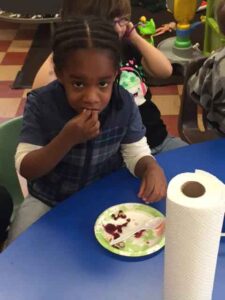
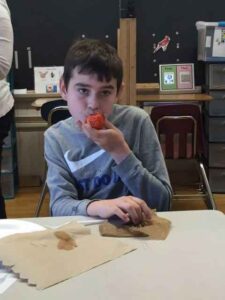
Week 6: Whole and Processed Food Comparisons.
This week, students learned the difference between whole and processed foods. We looked at packaging and ingredients to determine if foods are whole or processed. Students classified whole foods as “all the time food” and processed food as “sometimes food”. We related this week’s lesson to the previous week by reviewing the vitamins our bodies get from whole “all the time” food. Vocabulary related to week 6: all-the-time food, sometimes food, processed, whole, and food label. Students tasted roasted potatoes prepared with olive oil and salt.
Week 7: Eating with our senses: edible sculptures.
Students learned to appreciate the beauty of colorful whole foods, using color and shape to inspire them to appreciate the aesthetics of the foods they eat. Food can be both nutritious and visually appealing. We all use more than just our sense of taste when eating. We look at, smell and often touch food! Vocabulary related to week 7: senses, touch, taste, smell, hear, see, and food art. Students created sculptures and pictures with shredded and sliced carrots, sliced red pepper, grapes, lettuce, sliced bananas, dried cranberries and raisins. They were encouraged to taste their food as they explored with their other senses.
Week 8: Seasons.
This week students learned that Ohio experiences four seasons each year. We reviewed the concept of growing and harvesting times, and that foods have their own growing and harvesting season. Many foods in Ohio are harvested in the fall. As a supplemental activity, many students created leaf art by rubbing paper over a leaf with a crayon. Vocabulary related to week 8: summer, spring, winter, fall, harvest, seasons, and kale. Students tasted baked kale chips prepared with olive oil and salt. The kale chips were surprisingly a huge hit!
Week 9: Eating Locally All Year Long: Preserved Foods.
Students learned that foods grown in gardens and on farms in Ohio during summer and fall can be preserved and eaten during the winter. We discussed canning, freezing and drying to help us eat locally all year. Vocabulary related to week 9: canning, drying, freezing, preserving, cold, sour, sweet and cranberries. Students tasted cranberries four ways: whole, frozen, dried and canned!
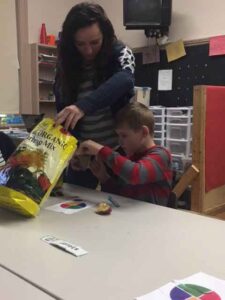
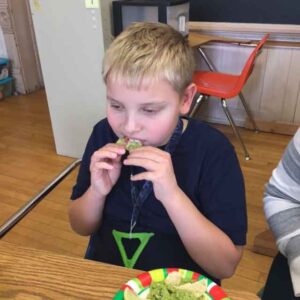
Week 10: Ohio Fall Fruits: Apples.
During week 10 students learned that apples and pears are fruits and are in season during the late summer and fall. We discussed different varieties of Ohio apples, their colors and how they taste. Many students read books about orchards and trees where apples and pears grow. An important fact that we’ve repeated all ten weeks is “fruits have seeds!” Vocabulary related to week 10: apple, pear, fruit, seeds, and orchard. Students tasted three types of apples: fuji, golden delicious and granny smith.
Week 11: Healthful Fats and Oils.
Students learned the importance of eating healthful fats and how to classify healthful vs. harmful fats. Healthful fats are important for our heart and brain. Some classrooms experimented with straws to learn how healthful and harmful fats move through our arteries. Vocabulary related to week 11: arteries, blood, brain, heart, fats, healthful, and processed. Students helped teachers and therapists prepare guacamole with a healthful fat, avocado.
The first half of the Food Matters lessons has been so fun. We’ve received a lot of great feedback. Mr. Ramsey, a teacher in the Coyote class, stated, “Every single one of my students has tried every single food except when they were absent.” Mr. Adam in the Cheetahs said, “I have had 3 separate parents tell me that they have seen a real difference in what their child is willing to try at home. They aren’t eating a whole meal of new things but they aren’t refusing to take bites of things like they had before”. Lindsey Cargill, a speech-language pathologist, has two sons in preschool. She stated that one of her son’s dreads coming to school on Local Matters days, but he always tries every new food and excitedly runs to tell her after the lesson.
As you are carrying over the vocabulary at home, remember to keep it fun and encourage trying new foods with our key phrases:
- “It’s my favorite” or “it’s not my favorite”.
- “Take one bite/taste, then you can say no thank you if it’s not your favorite”.
We can’t wait to start the second half after winter break!
This project has been funded, in part, by the Reinberger Foundation. We are grateful for their support.